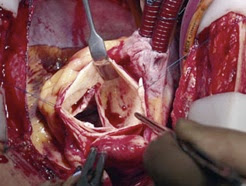A few months back I was covering the inpatient consult service when one of our patients on peritoneal dialysis came in for an elective combined aortic valve replacement and coronary artery bypass grafting. She had recently switched over from in-center HD to PD and still had a functional arteriovenous graft in place.
The surgery went well and the patient came out of the operating room to the cardiac critical care unit.
As I sat reviewing the chart my attending posed the following question “So is it reasonable to continue PD here in the unit or should we switch over to HD until she’s extubated and clinically improving?”
Would the increased intra-abdominal pressure from PD lead to prolonged intubation time? Given the manipulation of the thoracic cavity was there a higher risk of dialysate leak through the diaphragm? Would we be able to provide adequate clearance and ultrafiltration with PD? Would the infection risk be higher for PD given the relative unfamiliarity of the nursing staff?
A recent article in Peritoneal Dialysis International comparing perioperative outcomes in patients on PD and HD post cardiac surgery sheds some light on the situation. In the study the Southern California Permanente Group at Los Angeles Medical Center looked back at 15 years of CABG and cardiac valve replacement surgeries in ESRD patients and compared a variety of outcomes between 36 patients on PD and 76 on HD.
There were no reported significant differences between the two groups at baseline including age, dialysis vintage, presence of diabetes, type of surgery and Charlson comorbidity index. The only statistically significant difference in terms of outcomes was a slightly longer median length of stay in the cardiac surgical unit for HD patients (4 vs 2 days) though the median total hospital length of stay between the two groups was no different (PD 9.5 days, HD 10 days).
There was trend towards more infections in the HD group (19% vs 6%) but this did not reach statistical significance. Median intubation time was the same between groups. Survival perioperatively (defined as during the hospital stay or within 30 days of operation) and at one and two years was similar between groups (PD 89%, 81%, 69%, HD 90%, 78%, 66%).
Conversion of PD patients to HD occurred in just 6% percent of patients. One for dialysate leak and another for uncontrolled azotemia. CRRT was needed in 1 HD patient due to hemodynamic instability.
The study doesn’t answer the question of whether converting a patient on PD to HD or CRRT might improve outcomes but it does provide reassurance that PD patients don’t have an excessive risk of dialysate leak or inability to achieve adequate clearance and ultrafiltration. It also shows that in general outcomes post cardiac surgery between PD and HD patients are similar.
In our patient we continued peritoneal dialysis using an automated cycler without difficulty. Over the weekend the covering team changed to HD via the arteriovenous graft over concern that PD might lead to a dialysate leak. Unfortunately the patient tolerated HD poorly with episodes of hypotension so we transitioned back to PD when we came back on. The rest of her hospitalization was without incident.


we in colombia have had good experience in acute heart failure and also in few patients after cardiac surgery.Daniela Ponce de brazil is one that has more experience in acute peritoneal dialysis.http://1.usa.gov/1L02Tqh
A good and informative post. Good job!!
Well done! Good thinking.
Thanks guys. It's a really interesting question: PD, HD or CRRT post cardiac surgery?
I like that with PD I can ramp up ultrafiltration at odd hours if need be without the logistics of calling in a dialysis nurse and getting the machine wheeled in. Our post cardiac surgery patients are often on a cocktail of drips and getting behind on volume can be a real issue.
CRRT is also a nice option when daily obligate ins are high and the patient is already in the unit.
Great post Graham. We were just having this discussion the other day on the ward.
I find there is an 'inherent' mis-trust amongst our surgery collegues that PD will not work post cardiac sugery.We do manage patients on PD after cardiac surgery and they seem to be doing ok. Only 24 hour immediate post op period seem to be crucial and then the pts tolerate PD well thereafter.